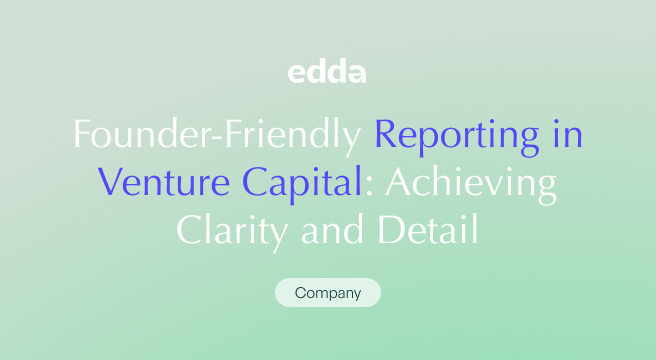When it comes to venture capital, effective communication transcends the boundaries of mere transactional exchanges. It’s about crafting reporting systems that intelligently balance detailed insights with ease of comprehension for founders. Without founder-friendly reporting, VC firms risk creating a disconnect with their portfolio companies, leading to misaligned strategies and potentially jeopardizing investment outcomes.
This article explores methodologies venture capital firms can adopt to develop reports that are both informative and accessible, enhancing the practice of founder-friendly reporting. Furthermore, discover how Edda’s portfolio management tool (a popular Affinity alternative), offers comprehensive, founder-friendly data reporting.
Rationalizing Complexity in Data Reporting
The primary challenge for VC firms lies in converting a dense array of data into formats that are readily comprehensible to founders. This involves distilling complex information into more straightforward visual and textual formats. The objective here is to provide informative content without overwhelming the recipient, enabling founders to leverage this data effectively in their decision-making processes.
How can firms break down complex data into more founder-friendly, digestible formats?
Use of Visual Aids: One effective strategy is the incorporation of visual aids such as charts, graphs, and infographics. For instance, instead of presenting raw financial data, a VC firm could use a bar graph to depict a startup’s revenue growth over time or a pie chart to illustrate the breakdown of expenses. These visual tools can transform a dense table of figures into an instantly understandable snapshot, facilitating quicker comprehension and analysis by founders.
Summarizing Key Points: Another approach is to provide summaries or highlights of critical data points. For example, in a quarterly performance report, key metrics like cash burn rate, customer acquisition costs, and monthly recurring revenue could be highlighted at the beginning of the document. This summary gives founders a quick overview of the most crucial aspects of their company’s performance, allowing them to grasp the essentials without delving into the more detailed data unless necessary.
Storytelling with Data: Presenting data within a narrative context can also be highly effective. By framing data in a story format, such as outlining the journey of a product from development to market launch and its impact on sales, VCs can make the information more relatable and engaging for founders. This storytelling approach not only simplifies the data but also helps founders connect the dots between different data points.
Tailoring Reports to Suit Diverse Needs
In venture capital, the diversity of portfolio companies necessitates a bespoke approach to reporting. Each startup operates within its own unique set of circumstances, influenced by factors such as market sector, stage of development, and strategic objectives.
To ensure the maximum utility and relevance of reports, venture capitalists must customize them to resonate with these individual operational realities. Below are strategies and tips for tailoring reports to meet the diverse needs of different companies:
Sector-Specific Considerations: Different sectors have distinct metrics and KPIs that are critical to their success. For a tech startup, user engagement and technology development milestones might be crucial, whereas for a retail business, inventory turnover and same-store sales growth could be more relevant. VC firms should identify and focus on these sector-specific indicators in their reports.
Stage of Development: The stage of the company, whether it’s a newly founded startup or a more established business, significantly influences the type of data that’s most relevant. Early-stage companies might require a focus on burn rate and user acquisition, while growth-stage companies might need more detailed financial performance analysis.
Customizing Report Content
Personalized Dashboards: Creating personalized dashboards for each portfolio company allows for the display of the most pertinent information upfront. This could include a mix of financial data, operational metrics, and strategic milestones relevant to the specific company.
Modular Reporting: Implement a modular reporting system where different sections or modules of the report can be customized according to the needs of each startup. For example, one module could focus on financial data, another on customer metrics, and a third on product development, depending on what’s most relevant to the company at that time.
Enhancing Report Relevance and Actionability
Collaboration with Founders: Engage with founders to understand what information they find most useful. This direct feedback can guide the customization of the reports, ensuring that they address the specific questions and challenges the founders face.
Scenario Analysis: Include scenario analysis in reports, especially for strategic planning. This could involve showing how different decisions or market conditions could impact the startup, thereby helping founders understand the implications of various strategic choices.
Actionable Insights: Focus on providing actionable insights rather than just data. This means interpreting the data in a way that founders can use to make informed decisions about their business strategies.
Regular Review and Adaptation
Iterative Improvement: Reports should not be static; they should evolve as the company grows and its needs change. Regularly review and adapt the content and format of the reports to ensure they continue to be relevant and valuable.
Utilizing Technology for Flexibility: Employ report generation tools that offer flexibility and ease of modification. This enables quick adjustments to the reports as needed, without significant time investment or technical challenges.
Leveraging Technology for Interactive Reporting
Informed decision-making is central to success in venture capital, and the adoption of interactive reporting marks a significant step forward. This technology-driven approach reshapes the traditional static report into a dynamic and engaging experience.
Interactive reporting empowers founders to probe deeper into data, offering them a platform to experiment with various scenarios and derive nuanced insights. This method not only enriches the user experience but also enables founders to engage with data in a more profound and significant manner.
Core Attributes of Interactive Reporting
Interactive Data Exploration: These reports provide features like clickable elements and detailed breakdowns upon interaction. For example, founders can examine a specific revenue segment in greater detail by simply clicking on it, revealing underlying factors contributing to performance. This capability allows for a layered understanding of the business metrics.
Modeling and Forecasting Capabilities: A key aspect is the ability for founders to test different business scenarios. For instance, adjusting market growth projections or operational costs to visualize potential impacts offers invaluable foresight for strategic planning.
Continuous Data Refreshing: Interactive reports are often linked to live data, ensuring that the information remains current and reflective of the latest trends and figures. This attribute is particularly advantageous in the rapidly changing business landscapes where VC firms operate.
Personalized Dashboard Views: Founders can tailor their dashboard views to prioritize key metrics relevant to their specific context. This customization ensures that the data presented is directly aligned with their strategic focus areas.
Advantages of Leveraging Interactive Reporting
Interactive reporting has revolutionized the way founders engage with data in the venture capital ecosystem. Significantly increasing founder involvement, these tools provide an engaging and dynamic interface for data analysis. This is crucial for making well-informed business decisions. As founders regularly interact with data through these interactive platforms, they enhance their ability to understand and interpret complex information. This naturally leads to improved strategic decision-making.
Beyond individual analysis, interactive reports serve as a catalyst for deeper conversations between founders and venture capitalists. They create a shared platform for examining data, sparking collaborative discussions, and exploring strategic directions together.
Additionally, the self-service nature of these tools empowers founders to independently generate insights. This autonomy in navigating and understanding their business data fosters a stronger sense of ownership and a more profound alignment with their strategic objectives. This holistic approach to data analysis and strategy development marks a significant stride in the collaboration between founders and venture capital firms.
Venture Capital Software Tools for Founder-Friendly Reporting
Fostering strong and transparent relationships with portfolio companies is essential. This is where Edda’s comprehensive dealflow software suite comes in handy, especially in creating reports that are easy to understand for founders. Edda’s versatile features are a perfect match for the detailed and accessible reporting needs of the VC industry.
Centralization and Streamlined Data Management: Edda’s venture capital software centralizes the entire investment process, making data management less complex. This centralization is crucial for founders since it gives them a unified and coherent view of their company’s performance and market position. Edda’s comprehensive approach to data management ensures that founders receive a cohesive narrative that aids in understanding their company’s trajectory, not just fragmented data.
Customization and Relevance: Edda’s robust customization capabilities ensure that reports are not only comprehensive but also tailored to the unique needs of each portfolio company. Edda’s software adapts to provide relevant and actionable data, resonating with the specific operational realities and strategic objectives of each startup, whether it’s sector-specific insights or stage-of-development considerations.
Interactive Reporting and Enhanced Engagement: Edda’s interactive reporting tools transform static data into an engaging experience. Founders can delve deep into specifics, explore various scenarios, and derive nuanced understanding, all within an interactive and intuitive interface. This feature enriches the user experience and empowers founders to engage with data more constructively and meaningfully.
Real-Time Data and Forecasting: By using Edda’s real-time data features, founders receive up-to-the-minute insights. The forecasting capabilities embedded within Edda’s platform allow founders to model different business scenarios, aiding in strategic planning and decision-making.
Collaboration and Strategic Dialogue: Edda facilitates a platform for collaborative strategy development. By providing a common ground for data exploration and discussion, it fosters a deeper, more productive dialogue between venture capitalists and founders, leading to joint strategic exploration and informed decision-making.
The deal flow management software provided by Edda serves not only as a means of managing and reporting data, but also as a means of fostering stronger and more transparent relationships between venture capitalists and founders. Through the provision of relevant and interactive data, Edda empowers founders and plays a pivotal role in promoting informed decision-making and strategic alignment within the venture capital industry.









